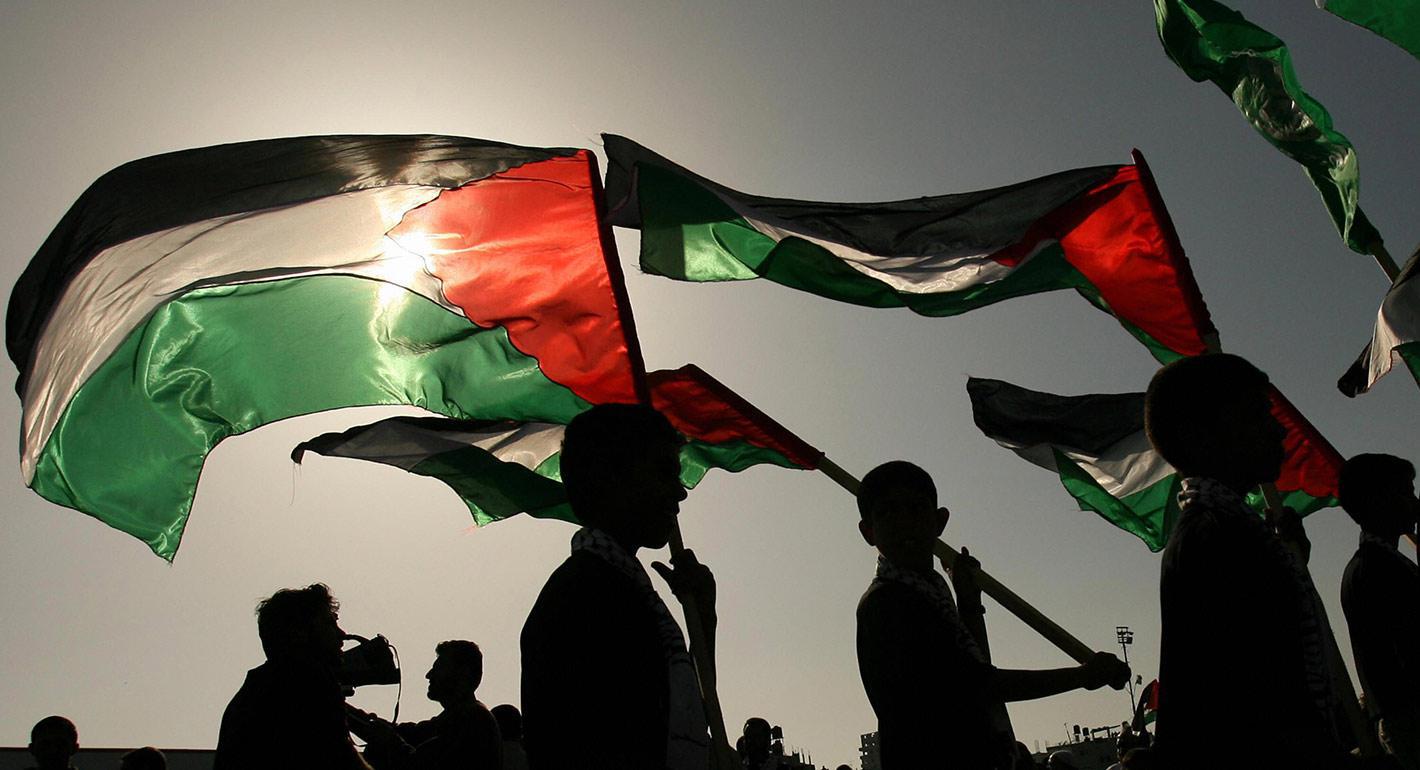When democracies and autocracies are seen as interchangeable targets, the language of democracy becomes hollow, and the incentives for democratic governance erode.
Sarah Yerkes, Amr Hamzawy
{
"authors": [
"Zaha Hassan"
],
"type": "legacyinthemedia",
"centerAffiliationAll": "",
"centers": [
"Carnegie Endowment for International Peace"
],
"collections": [],
"englishNewsletterAll": "",
"nonEnglishNewsletterAll": "",
"primaryCenter": "Carnegie Endowment for International Peace",
"programAffiliation": "",
"programs": [
"Middle East"
],
"projects": [],
"regions": [
"North America",
"United States",
"Middle East",
"Palestine"
],
"topics": [
"Political Reform",
"Democracy",
"Economy"
]
}
With more than 750,000 Israeli settlers in the West Bank and East Jerusalem now, the stakes are much higher in 2020. The U.S. should create a new model for bilateral support that entrenches Palestinian sovereignty rather than incentivizes Israeli settlements.
Source: Responsible Statecraft
The tripartite agreement between the United Arab Emirates, Israel, and the U.S. to normalize Emirati-Israeli relations in exchange for an Israeli commitment to sideline plans to officially annex parts of the occupied Palestinian territories, does nothing to advance prospects for creation of a Palestinian state; rather, it is consistent with the “outside-in” approach the U.S. has historically pursued which helps Israel build ties with Arab states while continuing to settle its population on Palestinian lands.
Along the same lines, a new initiative recently passed in the U.S. House of Representatives aims to preserve the prospects for a Palestinian state, but instead is likely to support Israeli business ventures in the West Bank at a time when annexation still looms.
The proposed $250 million fund, included in the State and Foreign Operations appropriations bill, will be partly used to support private sector partnerships between Palestinians and Israelis. Based on past experiences, the fund is likely to become one more example of how — under the guise of supporting Palestinians — the United States plays into efforts to liquidate Palestinian national aspirations.
The stated objective for the House’s “Joint Investment for Peace Initiative” is to jumpstart the Palestinian economy, support a negotiated two-state solution, and facilitate ties between Israel and the Arab world. With the Palestinian Authority on the verge of financial collapse, and 24 percent unemployment across the occupied Palestinian territories, any money to support job creation and entrepreneurship in the West Bank and Gaza should be a welcome development.
Like the Investment Initiative, a 1995-1996 effort to extend the U.S.-Israel Free Trade Agreement to the West Bank and Gaza was meant to bolster Palestinian economic development and regional trade. But what it did was ensure that Israeli settlement goods received preferential treatment in the U.S. and undermine Arab resolve to end Israeli occupation.
With more than 750,000 Israeli settlers in the West Bank and East Jerusalem now and annexation of large parts of the West Bank still likely on the horizon, the stakes are much higher in 2020. The U.S. should create a new model for bilateral support that entrenches Palestinian sovereignty rather than incentivizes Israeli settlements. It can do this by revising the Joint Investment Initiative bill, the U.S.-Israel Free Trade Agreement, and other similar programs so that Israeli settlers and settlement enterprises are specifically excluded.
The State Department Foreign Operations and Related Programs Appropriation Act 2021, which includes the “Joint Investment for Peace Initiative,” passed in the House on July 24 and would provide U.S. loans and other support to private entities that “carry out projects that contribute to the development of the Palestinian private sector economy.” Among the Initiative’s stated objectives is to support a viable Palestinian economy necessary for a two-state solution, and to encourage engagement between Palestinians and Israelis with benefits to them and to the region.
While supporting Palestinian economic development is laudable, Palestinians are unlikely to participate because of a loophole that allows Israeli settlers operating businesses in and exploiting the natural resources of the West Bank to obtain U.S. financial backing. This opening for settlers is likely not accidental. In fact, earlier versions of the bill specifically prohibited “geographic discrimination” defined as denying grants to “any community or entity in Israel, the West Bank, or Gaza due to its geographic location.” A 2019 Senate Appropriations Committee report discussing an earlier version of the bill explicitly stated that funds should be used “to encourage commerce between Israeli and Palestinian businesses in the West Bank.”
Some may argue that if allowing some Israeli settlers to benefit from the Initiative is the only way to ensure bipartisan support for the bill’s passage then it is better than the alternative of having no such development assistance for Palestinians at all. However, if Congress believes that “building a viable Palestinian economy is central to the effort to preserve the possibility of a negotiated settlement leading to a sustainable two state solution,” than whether settlers benefit matters a great deal.
It is precisely Israel’s settlement enterprise and the extensive land expropriation and restrictions on movement of goods and people it brings that prevents Palestinian economic development; it is not a lack of Palestinian ingenuity or capital. By providing financial support to settlers and prioritizing joint ventures with Israelis, Congress will only incentivize more settlement activity and snuff out the remaining prospects for a two-state solution.
Believing a Palestinian state was on the horizon, in October 1995, PLO Chairman Yasir Arafat signed an agreement with the U.S. promising to work for an end to the Arab League boycott of Israel and to extend preferential treatment to U.S. goods. A year later, following congressional authorization, President Bill Clinton signed a proclamation to extend the benefits of the U.S.-Israel Free Trade Agreement to the West Bank and Gaza.
A bilateral trade agreement between the United States and the PLO was not possible at the time because to do so meant implicit U.S. recognition of the state of Palestine, something the U.S. would only do after Israelis and Palestinians had signed a peace agreement. And neither could President Clinton, consistent with international law and U.S. policy, treat the occupied Palestinians territories as part of Israel sovereign territory. The proclamation was essentially a creative legal work-around.
The move was meant to allow Palestinian products to benefit from duty-free treatment in the U.S. “identical to…products of Israel,” “provid[ing] new employment opportunities for Palestinians outside Israel proper, and “lur[ing] increased foreign investment to the West Bank and Gaza.” Then-Rep. E. Clay Shaw Jr. (R-Fla.), co-sponsor of the authorizing bill for the proclamation, was more optimistic, stating that it would “help the establishment of a Palestinian state.” Though the value of Palestinian exports to the U.S. was relatively insignificant in the 1990s, the understanding was that the peace process and an infusion of international donor support would catapult the Palestinian economy and bilateral U.S.-Palestinian trade would flourish.
But that’s not what happened. Out of the 233 countries the United States currently trades with, the West Bank ranks near the bottom as the United States’ 208th largest trading partner worth a total of $3.83 million for the first six months of 2020. Israel, by comparison, conducts about 10 times that amount with the United States in a single day.
If history is any guide, once it is ultimately signed into law, the bipartisan initiative the House passed in July will suffer a similar fate and be yet another trojan horse designed to allow the United States to appear to be preserving the prospects for a Palestinian state, while in fact enriching Israeli settlers and normalizing their permanence in the region.
Indeed, these measures neither provide guarantees that Palestinian goods will move unhindered at ports and crossings controlled by Israel, nor that Palestinians will have access to their natural resources and land in order to produce goods for the marketplace. U.S. programs that allow Israeli settlers to participate or benefit only incentivize the expansion of settlements and settler enterprises and encourage the displacement of Palestinians. Today, settler enterprises and the Israeli military backing them cost Palestinians in the West Bank billions per year in lost income.
Compounding the lack of confidence in the endeavor’s success, USAID will not be responsible for administering the program. Instead, that task will fall to U.S. International Development Finance Corp., a new government agency headed by Adam Boehler, a former corporate executive with no development experience and Jared Kushner’s college roommate.
Economic development for Palestinians has become a battle-tested tool for facilitating the twin objectives of blurring the lines between Israel and the occupied West Bank and breaking Arab resolve about the limits of relations with Israel while occupation endures. The best way the United States can help Palestinian development is to disincentivize continuation of Israel’s military occupation over the West Bank and not seek to normalize Israeli presence by encouraging regional economic integration.
Allowing settlers to benefit from U.S. economic programs isn’t just bad foreign policy, it also happens to be a war crime under international humanitarian law. To preserve the possibility of a durable resolution of the Palestine-Israel conflict and to avoid U.S. complicity in rights violations abroad, Congress and the administration should ensure that all programs aimed at promoting Palestinian economic development including the extension of free trade to the West Bank and Gaza and the Joint Investment Initiative are revised to include language restricting Israeli settlers and settlement enterprises from benefitting.
Carnegie does not take institutional positions on public policy issues; the views represented herein are those of the author(s) and do not necessarily reflect the views of Carnegie, its staff, or its trustees.
When democracies and autocracies are seen as interchangeable targets, the language of democracy becomes hollow, and the incentives for democratic governance erode.


Sarah Yerkes, Amr Hamzawy
German manufacturing firms in Africa add value, jobs, and skills, while benefiting from demand and a diversification of trade and investment partners. It is in the interest of both African economies and Germany to deepen economic relations.
Hannah Grupp, Paul M. Lubeck
Unexpectedly, Trump’s America appears to have replaced Putin’s Russia’s as the world’s biggest disruptor.

Alexander Baunov
From Sudan to Ukraine, UAVs have upended warfighting tactics and become one of the most destructive weapons of conflict.


Jon Bateman, Steve Feldstein
And how they can respond.



Sophia Besch, Steve Feldstein, Stewart Patrick, …